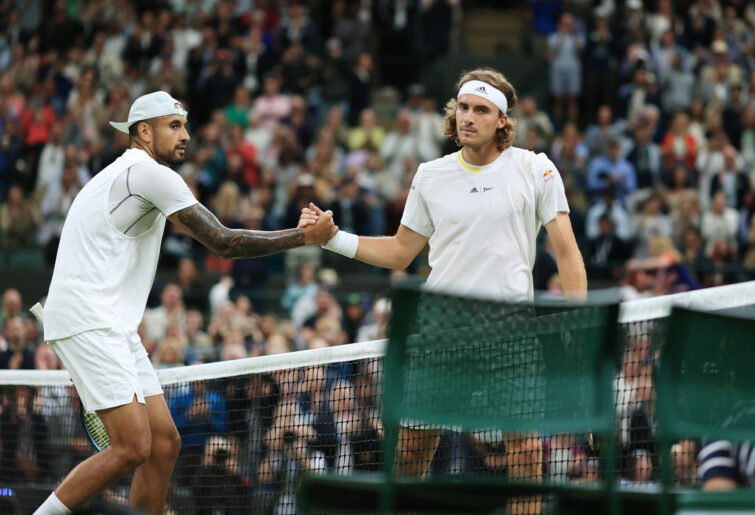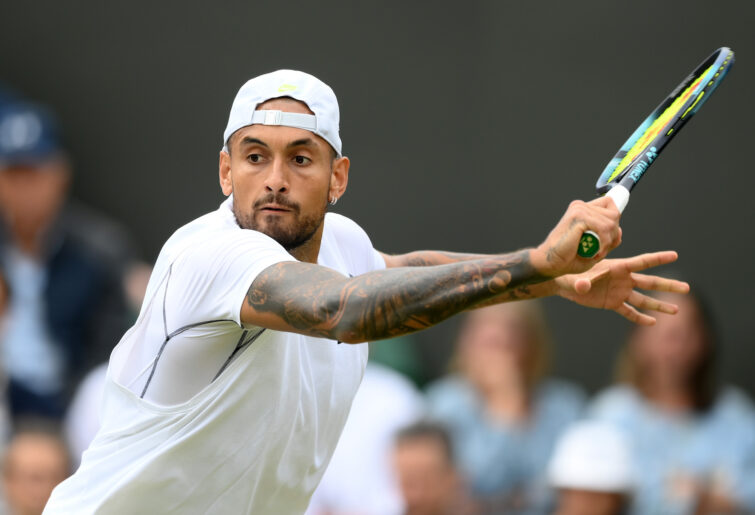Robin
new author
Roar Rookie
Opinion
You may not like it, but you are Nick Kyrgios. At least, we are Nick Kyrgios.
As Kyrgios progresses, round after round, it’s clear that he’s playing some of the best tennis of his life. His serve is Thor’s hammer, his touch sublime.
He’s rushing his opponents with his ability to contemptuously hit good balls on the rise, his breakneck pace of play on serve and a forehand that switches incredibly late from inside-out to inside-in.
Yet at each press conference more social issues are raised. Abuse towards others. Abuse from others. The impact of racism. Bullying.
Repeatedly, Kyrgios is called upon to review and explain his behaviour. His opponents are called upon to review and explain his behaviour. It is perhaps those comments that are the most revealing.
Kyrgios clearly has the potential to bring some of the worst in others to the fore if they are not well defended. The words of Stefanos Tsitsipas, sensitive and reflective after his third-round defeat in during which he hit a ball into the crowd in frustration, are especially compelling.
“I have to say, it was really bad from my side. I’ve never done that before, throwing the ball outside the court in that way. I did apologise to the people. I don’t know what went through my head that time… it’s my responsibility for sure but there was also something that, created, that behaviour that I’m not used to see myself.
“He has some good traits in his character as well, but when he, he also has a very evil side to him, which if it’s exposed, it can really do a lot of harm and bad to the people around him… it just feels very messy. It just feels like, disorganised in a way.”
During the press conference, upon the suggestion of a journalist, Tsitsipas resonated with the idea that the tennis community should consider some sort of collaborative intervention to bring Kyrgios’ chaos into order.

A frosty handshake after the third-round battle (Photo by Simon Stacpoole/Offside/Offside via Getty Images)
There are several things about Kyrgios that make him the ideal irritant, to opponents, the media and the community at large. Through his play and frequent chatter he restricts the ability for his opponent to find their usual rhythm.
It is at these times of disorientation, when structure and rules are disrupted, that those around him seem vulnerable to loss of composure. He argues with officials, seemingly pointlessly, and although speculation of methodical gamesmanship will always be present, he frequently appears genuinely yet unreasonably aggrieved.
During interviews, he can be intemperate and devoid of good demeanour under the guise of honesty and candour. However mostly it is his reticence to apologise, to see the views of others, and to recognise when he has hurt others that disqualifies him from our forgiveness.
It’s particularly confronting that he is receiving the rewards of elite sport while doing so.
He’s hypocritical. Despite his bravado we know that negative commentary and abuse distresses him. He shows it and he’s previously made it clear. During his first-round victory he highlighted the impact an abusive spectator had upon him.
Yet during the same match he suggested that a linesman was too old to do his job and later denied that this could have harmful impact.
Of course, most people would recognise that such comments are made more egregious due to the fact that linespeople are in a vulnerable position, dutifully bound in an almost thankless task that will only ever rise to prominence at times of error and public shame.
Yet Kyrgios appears to struggle to view the world and himself objectively, empathically take the perspective of others and take the good with the bad.

(Photo by Shaun Botterill/Getty Images)
But what do we want from him? Haven’t we all said cruel things to others, felt that we were mistreated and complained about it? Failed to recognise the harm we have caused? Surely.
However, when we watch sport, we want the opportunity to vicariously experience what we cannot, something that we can strive for. To be powerful, agile, graceful and then be gracious and well-integrated.
If that’s not all there, we only have the cheap alternative, the voyeuristic joy of being witness to yet another incident that makes a person properly “box-office”.
It’s much more palatable to adopt the finished product, the Bjorn Borg or Roger Federer, but only once they’ve managed to knock off their rough edges in relative privacy of their junior careers.
It may be beneficial to accept that the current version of Nick Kyrgios does not have the inclination or capacity to be the complete hero-package. His experiences, his capabilities, his environment, his role models and influences will all be contributing, as they do for all of us.
He has risen to prominence as a tennis player, admittedly a job that involves considerably more than hitting tennis balls, but one that does not automatically include being an ethicist.
There are rules for him to follow and at times when the rules of tennis are breached he is liable to code violations and fines. From his point of view, that appears to be adequate restitution. It’s likely fruitless to ask for more.
Most controversial characters are so because of the unacceptable societal elements that they represent. During the time of Donald Trump for it was valuable to consider that he represented a symptom of the society around him rather than the disease itself.
It’s equally valuable to reflect on how Kyrgios makes others feel, to think about how we recognise what is within us, and learn to contain and manage it.
Mostly he teaches a lesson of acceptance. To recognise that there are many people who are disorganised and “messy” who can yet be appreciated. More importantly, to recognise that there are elements within each of us that are unpalatable that can be all too easily drawn out at times of disorientation and chaos.
Could he be brought to order by a community intervention that leads him to some epiphany of awareness? Unlikely, and much would be lost. Nick is ours and Nick is us.
Each in different amounts and proportions, a collection of brilliance, petulance, anger, cheekiness, fears and skills.
Variously well-integrated and self-aware. He’s different but perhaps not that different. At very least, for the moment we shouldn’t be too distracted.
He’s playing some great tennis. Don’t look away.